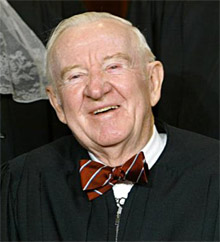 |
 |
 |
 News from Around the Americas | August 2005 News from Around the Americas | August 2005  
Justice Stevens Criticizes Death Penalty
 Gina Holland - Associated Press Gina Holland - Associated Press


| | John Paul Stevens, named to the high court by President Ford in 1975, is one of the most liberal justices. |
Chicago - Supreme Court Justice John Paul Stevens issued an unusually stinging criticism of capital punishment Saturday evening, telling lawyers that he was disturbed by "serious flaws."

Stevens stopped short of calling for an end to the death penalty, but he said there are many problems in the way it is used.

Recent exonerations of death row inmates through scientific evidence are significant, he told the American Bar Association, "not only because of its relevance to the debate about the wisdom of continuing to administer capital punishment, but also because it indicates that there must be serious flaws in our administration of criminal justice."

Other Supreme Court justices, including Sandra Day O'Connor and Ruth Bader Ginsburg, have also spoken out about concerns that defendants in murder cases are not adequately represented at trial.

But Stevens, 85, made a much harsher and sweeping condemnation.

He said the jury selection process and the fact that many trial judges are elected also work against accused murderers. He also said that jurors might be improperly swayed by victim-impact statements.

Stevens, named to the high court by President Ford in 1975, is one of the most liberal justices.

In recent years he has been influential in votes that barred states from executing mentally retarded killers and those who were juveniles when they committed their crimes.

The Supreme Court frequently splits 5-4 in capital cases, and often O'Connor is the pivotal vote.

O'Connor, 75, announced last month that she was retiring, and Stevens told lawyers that her departure was "sad news for me."

"It's really a very, very wrenching experience," he said.

President Bush has nominated as her successor appeals court judge John Roberts, a former lawyer in the Reagan and first Bush administration who would likely make the court more conservative.

Stevens made his exceptionally frank and surprising comments in Illinois, his home state and a place that has been roiled by controversy over the death penalty. In 2000, wrongful convictions led then-Gov. George Ryan to halt all executions.

It also came just a day after a Virginia jury decided against the inmate whose case led to the 2002 ban on executing the mentally retarded. The jury said Daryl Atkins was mentally competent and could be put to death. The judge immediately scheduled a December execution date.

Stevens' audience included his wife and Cecilia Marshall, widow of Justice Thurgood Marshall.

Marshall, the Supreme Court's first black member before retiring in 1991, was a critic of the death penalty and argued that it was unconstitutional under any circumstances.

"Since his retirement, with the benefit of DNA evidence, we have learned that a substantial number of death sentences have been imposed erroneously," Stevens said during a dinner named for Marshall.

He said Supreme Court cases have revealed that "a significant number of defendants in capital cases have not been provided with fully competent legal representation at trial."

In addition, Stevens said he had reviewed records that showed "special risks of unfairness" in capital punishment.

Juries might not be balanced because people who have qualms about capital punishment can be excluded by prosecutors, he said. And he questioned whether potential jurors are distracted by extensive questions about their views on the death penalty.

In addition, Stevens said a statement from a victim's family sometimes "serves no purpose other than to encourage jurors to decide in favor of death rather than life on the basis of their emotions rather than their reason." | 
 | |
 |



